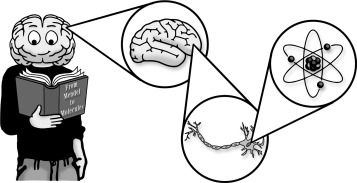One of the primary arguments of critical psychiatry has arguably been a staunch rejection of ‘reductionist’ understandings of mental illness and the assertion that the ‘brain disease’ model leaves no room for meaning, human relationships, or social context. In a commentary in the BJPsych Bulletin, Mad studies scholar and psychiatrist Mohammed Abouelleil Rashed points to new, integrative approaches emerging from developments in science and philosophy built from these critiques. He suggests that it is time to transcend critiques focused on radical reductionism and instead look toward integration based on the continuity between the broader values of critical and orthodox psychiatry.
 The notion that mental health disorders should be reduced to brain disorders has been charged with lacking scientific validity, falling prey to longstanding philosophical misnomers, hampering scientific progress and patient outcomes in the course of treatment and long after it.
The notion that mental health disorders should be reduced to brain disorders has been charged with lacking scientific validity, falling prey to longstanding philosophical misnomers, hampering scientific progress and patient outcomes in the course of treatment and long after it.
Meanwhile, myths about critical and anti-psychiatry are rampant, with many onlookers believing, for example, that anti-psychiatry theorists oppose all psychiatric reform despite historical evidence that the movement has been capable of supporting limited agendas meant to meet immediate needs while pursuing the long-term goals. As with most revolutionary movements, voices urging the pursuit of common ground with more mainstream efforts can be heard alongside proponents of uncompromising radicalism.
Rashed, a Research Fellow at the University of London, is trained as both a psychiatrist and a philosopher of mental health and Madness. He uses this broad training to take stock of critical psychiatry’s principle charge of reductionism. In light of emerging debates about the definition and classification of mental disorders, he suggests that this charge has been duly noted by mainstream psychiatry and belies its search for truly integrative models of mental illness.
Rashed takes Duncan Double’s rendering of critical psychiatry as paradigmatic: ‘functional mental illness should not be reduced to brain disease. ’ Because psychopathology is functional, not structural (i.e., not denoting structural abnormalities in the brain), such reduction is ethically and scientifically unjustified. Yet, the more substantial purpose to critical psychiatry’s message is that, even if all psychopathology was accounted for in structural abnormalities in the brain, this understanding suggests the wrong approach for classifying, understanding, and managing ‘mental illness.’
While one still sees signs of the “goose chase” of causal, biological indicators of mental illness in psychiatry, Rashed points to a more recent, exemplary exchange on reductionism to discern what remains to be said by critical psychiatry.
Chiefly, arguments made for collapsing mental disorders and brain disorders into the overarching category, “disorders of the nervous system” is that “psycho-social factors ‘interact strongly’ with neurological disorders, whereas ‘disorders of the mind are rooted in dysfunction of the brain.’” These have been countered with claims that psychiatry is not neurology and that the biological dimension of mental health problems should not obscure their social, cultural, and psychological dimensions.
What is important here is that, despite their opposite conclusions, these arguments are both non-reductionistic in their accounting for non-biological causal and risk factors. Rather, the question is one of emphasis: genetic and neurological, or psychosocial.
He suggests the forced choice of emphasis and the terms of the debate are, in fact, out of keeping with developments in new mental health sciences:
“Here, gene-environment interactions, social determinants of health over the life course, individual psychology, and neuroscience are all relevant for an integrated understanding of health… The aim is to move beyond a biopsychosocial model that is integrative only in name and towards one that can provide concrete risk and causal pathways across the range of factors of relevance to a particular health condition.”
This exchange evinces the fact that it is possible to debate the distinction between mental disorders and brain disorders without falling into the radical reductionism against which critical psychiatry positions itself. If this reductionism is essential to critical psychiatry’s continuing relevance, the author suggests that it may have run its course.
However, if critical psychiatry aims to go further in the search for truly integrative approaches to mental health, this juncture of a potential alliance with mainstream psychiatry should give its adherents cause for celebration. Continuing debates on the boundaries and definitions of mental illness, the validity of current classifications, the efficacy and risks of medication, mental health activism, and others show that these other facets of the constructive critique of psychiatry and society are alive and well.
While these debates continue, it may be time to lay to rest the version of critical psychiatry that clings to the core goal of ending radical reductionism. New terms of debate about mental disorder suggest that we look ahead to issues lying beyond reductionism.
****
Rashed, M. (2020). The critique of psychiatry as we enter the third decade of the 21st century: Commentary on Critical psychiatry. BJPsych Bulletin, 44(6), 236-238. doi:10.1192/bjb.2020.10 (Link)















I didn’t understand the point of this article beyond perhaps saying that abolishing biopsychiatry in favor of purely psychosocial approaches may itself be reductionistic…if things like neuroscience want to be integrated into the new paradigm(s) then they need to prove themselves first, and anecdotal and/or correlational “evidence” doesn’t count.
Report comment
Removed for moderation.
Report comment
Isn’t labeling some as psychopathological, while affirming others as normal reductionist?
Report comment
Yes, if it’s done in a way which overgeneralizes from one aspect of their being.
Report comment
Yes, this is the burning question on the minds of those imprisoned by psychiatry and tortured by neurotoxins: Has “critical psychiatry” won the debate on reductionism?
Be careful who you’re calling “mad,” please. “Mad Studies” indeed.
Report comment
To write this article without any reference to power dynamics renders the entire effort almost meaningless.
Report comment
I can see how reducing radical reductionism might work to keep you guys in business indefinitely, however, from my perspective, that means, if not an increase, at least, a maintenance of the large “mental ill health” numbers we are seeing today, and that is a goal I find far from desirable and not very defensible.
Report comment
What do you mean? If getting reducing radical reductionism means getting rid of scientistic fallacies that undergird the entire biopsychiatric structure it goes a long ways towards deconstructing the very notion of mental illness itself (of course in practice the industry will continue to hang on and fight back).
Report comment
Wondering how you feel about the concept of “Mad Studies,” Frank…
Report comment
At least some of those – not all – critical to mainstream psychiatry need to learn how to play the politics game. For a movement to be successful, it needs both truthtellers as well as “Machiavellians”.
Robert Greene’s Laws of Power:
– Win Through Your Actions, Never Through Argument
Any triumph you gain through argument will be short lived. Resentment will fester in your opponents instead of a genuine change of opinion.
– Think as You Like, but Behave Like Others
By consistently going against the grain in public, people will begin to resent you for making them feel inferior. Practice blending in and hiding your true feelings to nurture the common touch. By doing so, you will be left alone to express your true beliefs in a targeted manner. Once a base of power is established, you can then begin to disseminate your beliefs gradually, and they are more likely to be adopted.
– When Asking for Help, Appeal to the Self-interests of Others, Never to Their Mercy or Gratitude
If you must ask for help, make sure your request includes a benefit for your ally that you can exaggerate beyond proportion. When your ally sees that there is something in it for them, they are more likely to respond with enthusiasm. Self-interest is the greatest motivator for people. Once you master the art of working out what others want and using it to further your own plans, there will be no limits on what you can accomplish.
– Stir Up Waters to Catch Fish
If you can stay calm while infuriating your opponents, you can gain an advantage. By finding their weaknesses, you can disturb them and play with them at will. The more angry they become, the more ridiculous they will appear. This will reduce their power.
– Preach the Need for Change, but Never Reform Too Much at Once
If you have recently entered a position of power or are an outsider trying to make a claim for it, respect the way people have been living up until this point. Too much change will engender a revolt. To introduce change, make it seem like a gradual and gentle improvement on the past.
– Use Selective Honesty and Generosity to Disarm Your Victim
A single honest gesture can help cover the traces of dozens of dishonest acts. By being generous, you can disarm even the most suspicious people. Once they are disarmed, you can manipulate them at will.
Report comment
The point being “what is the point of having a brain if it doesn’t respond to its environment?”.
In science reductionism, reduces our attention to focus on a small number of crucial assumptions and has produced wonders as a result. Without this idea we could not communicate on the Internet, like here, for instance.
But the charges against psychiatry and psychology is that they have taken this idea to a perverse extreme by excluding, almost in its entirety, consideration of the environment, merely peering inside peoples minds!
Report comment
They’re not even peering inside people’s minds, they’re peering inside people’s brains (or at least trying to) and then acting like the brain and the mind are the same thing.
Report comment
Actually, thinking about it, their not even peering at our brains (all the brain scans have resulted in absolutely zero ‘psychiatric knowledge’) unlike neurologists. What exactly is it they do? A lot of listening and encouraging patients to talk, which their unfazed by and doesn’t exactly have them imparting much wisdom, prescriptions and a sense eventually that they haven’t heard a word you’ve said. But they usually do all this with an air of concern and decency, go figure.
Report comment
Oh, I WISH they bothered to listen and encouraged patients to talk! Most of them don’t give half a hoot what the patient says, except to convey their “symptoms” for the doctor’s guidance in prescribing something to suppress them.
Report comment
They listen like lawyers listen, they pay attention but they’re filtering everything you say into whether it fits into a certain set of very narrow criteria as to whether it means anything.
Report comment
“listening’ should clearly have been in quotes! But truly most patients say too much to their doctors, most doctors would agree here busy as they are with heavy patient loads, but then again you can’t afford to say nothing either! – Talking to a shrink usually merely gives them ammunition to use to justify otherwise unjustifiable practices.
Report comment
Not only that, but it’s arguable that if and when psychiatry does discover anything empirical about our brains, then by definition it falls under the purview of neurology. Ergo, psychiatry is the field of medical science that addresses things that *aren’t* known by definition.
Report comment